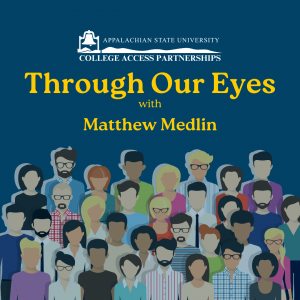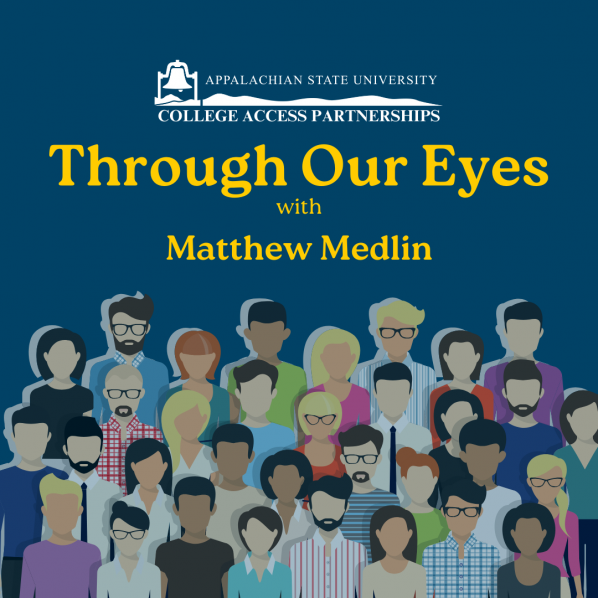In this series, we feature individual CAP staff members and dive into their unique perspectives on college access, education, the role of our grant programs in the community, and more. This month, we highlight Matthew Medlin, Upward Bound Academic Coordinator. Learn more about how Matthew and the Upward Bound team passionately serve their high school students and make important one-on-one connections that make their program so unique.
Tell us about yourself including your position, what you do, and how/why you got involved with CAP.
Hello Everyone! My name is Matthew Medlin and I am an Academic Coordinator with the Upward Bound Program. I first started with Upward Bound as a summer mentor while I was a student at Appalachian State. I continued working part-time with UB into my professional teaching career and was then lucky enough to apply and receive the coordinator position I hold now. Our program serves around 150 students from 7 surrounding partner high schools who share the goal of attending some form of higher education post graduation. Eligible students would be the first-generation in their family to go to college and/or come from a qualifying low-income household. My primary roles include facilitating in-person advising with our students throughout the school year and planning programming for our 6-week summer residential experience.
What would you want people to know about the grant program(s) with which you serve?
What I think is special about the Upward Bound Program that some may not know is that all of our students have to apply and interview as a 9th or 10th grader to be in our program. As we are limited in the amount of students we can serve, typically the ones who do apply are motivated students who truly value their education. I understand that college is not the appropriate direction for every student post-graduation, but there is something special that we are able to identify a group of around 50 new local students each year who are willing and ready to start taking steps towards their college journey early. Any group or program is inherently more successful when there is buy-in from the participants. As a result of our students all sharing the goal of attending college, almost 100% of our students graduate high school, and the high majority of them will enroll and complete postsecondary education. I could not be happier for or more proud of the students that choose to challenge themselves by participating and completing our program.
What do you perceive to be the biggest point of pride for CAP
Typically in rural areas, access to additional educational support or college access can be limited compared to urban areas. What CAP should be proud of is the fact that we are able to provide so many opportunities to students and teachers across rural Western North Carolina! CAP is a collaboration of different programs unlike anything else I have seen at partner institutions. Our local teachers get support through ETL, first-generation students are supported by YES and Upward Bound, GEAR UP is able to provide support for whole school districts, CAC works with seniors across the region to encourage college and career opportunities, and On Ramp is looking for ways to get students without a postsecondary plan to invest in their own futures and set goals. CAP is able to provide unique support for both students and professionals in an area that historically has been overlooked.
How have you seen the impact of CAP in our community?
Where I have been impressed with CAP and the connection to our community is staff they are able to attract. If you look across the people of CAP you will find we are primarily teachers, administrators, counselors or others with experience in public service. Everytime we grow or there is a new position available, CAP continues to bring in leaders from the community who help contribute to the overall mission. I attribute this to the individual success of each program that makes up CAP. We are relentless in growing our pursuit to support as many students, educators, and schools in Western NC as possible. Therefore, more are learning about the impact the different programs have and want to be a part of this team. Separate from the mission of CAP, the overall culture is very focused on collaboration which is effective in retaining hard-working team players.
Please share your thoughts on the role of CAP as it pertains to the future of education.
I feel like there will always be a need for the programs of CAP in the future of education. When a high school student graduates, the majority will likely choose to attend college or enter the workforce. There will always be students who need support with either of those decisions. Until there is enough local support for education, students, or educators in each county, CAP will have a purpose in this community.

